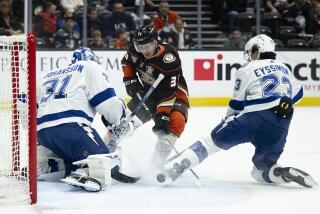More work, less talk
- Share via
The man who rules behind the bench of the team with the best record in the National Hockey League looks more rough than regal.
His long, curly hair may be a distant memory, but Randy Carlyle is still the guy who won the Norris Trophy in 1981 as the NHL’s top defenseman: a stocky 5 feet 10, quick eyes and a fire in his belly as he barks out orders to his high-flying Ducks. He is the best coach in hockey that nobody knows, long on substance and short on -- well, Carlyle doesn’t give a hoot about style in a region that often worships it.
He is stubborn.
He is intense.
Most of all, he knows the game. How a player thinks.
Honesty and hard work are the currency he values, even if it’s expressed through the use of a choice four-letter word or two.
“Hard work is no big deal in my mind,” Carlyle said. “I’m expected to work hard. If a player comes to me and says he’s working hard, so what. Everybody has to work hard. That’s a norm.”
Teemu Selanne, the Ducks’ popular forward, has seen it all before. Their paths crossed as teammates on the Winnipeg Jets when Carlyle was on the last leg of a long NHL career and Selanne was a hotshot rookie on the way to a record-breaking 76-goal season.
During a recent period break, a period in which the team played poorly, Carlyle launched into a tirade in the dressing room and Selanne couldn’t help but reminisce about that 1992-93 season. His coach might wear tailored suits these days, but that’s the only difference.
“Oh, he’s the same guy,” said Selanne, now 36. “He’s very tough on us. But he was like that when he was playing. No, he hasn’t changed.”
The Anaheim Ducks, as a franchise, have been the better for it since the 50-year-old Carlyle was named coach on Aug. 1, 2005. They’ve become one of the NHL’s success stories since the end of the bitter lockout that wiped out the 2004-05 season.
Much of the credit has gone to Brian Burke, the team’s high-profile general manager. In less than two years, a rejiggered roster of superstars, youngsters and role-playing veterans is now a juggernaut with a league-best 27-4-6 record and 134 goals scored.
But it took Carlyle, Burke’s handpicked leading man who shuns the spotlight, to make it work. In the dressing room, Carlyle is front and center.
“He is a players’ coach, but at the same time, like any good coach, he likes control,” defenseman Sean O’Donnell said. “It’s his way or the highway. Let’s just say that I don’t know how many one-on-ones you can win.
“I think he’s pretty stubborn. I don’t think he makes decisions without thinking ahead first. But once his mind is made up, it’s pretty much made up.”
Assistant coach Dave Farrish has seen that side of Carlyle for more than 30 years, watching it up close when the two were defense partners in junior hockey with the Sudbury Wolves.
“Randy’s been a take-charge kind of guy since he was a young age,” Farrish said. “Anybody who knows him knows he’s not afraid to speak his word. If you’re offended by it, so be it. That’s just the way he shoots. There’s only one way in his book.”
Asked about his intensity, Carlyle said, “Oh, I don’t know. Just part of my personality, I guess. I guess I’m not mellow. I say that I’m a ‘sometimes volatile’ person. Sometimes.”
Would his wife, Corey, agree on the sometimes? “She’s got another view on it,” he said, smiling.
From his first day as a rookie NHL coach, Carlyle installed a system that puts the Ducks in a relentless-attack mode, even on defense. That kind of play has made them the team to beat, but after Carlyle’s first few months on the job, things looked bleak. By Thanksgiving Day last year, the Ducks had eight consecutive losses, tying a franchise low, and were 8-11-4.
Playoffs? Carlyle was more concerned with getting his Ducks back on track, even as his resolve was tested.
“I think we stayed committed,” he said, “and that comes from ownership, all of management. Our players were working hard. It wasn’t like they turned us off. They were listening.”
From the beginning, Burke knew he wanted Carlyle -- then coach of the Manitoba Moose of the American Hockey League -- and once he got his man, left no doubt about who was in charge.
“We’ve made it clear from the get-go that with Randy, buying in is not an option,” Burke said. “If you’re not buying in, then you’re buying a new ZIP Code.
“We put body armor on Randy from day one. The players know Randy is in charge here.”
Anyone seen as a poor fit or who struggled to keep up with the fast-paced game Carlyle preached was sent packing: Sergei Fedorov, Petr Sykora, Sandis Ozolinsh, Keith Carney.
Burke made the deals, but it was Carlyle who said they had to be made.
Throughout, the message was clear -- the players would do things Carlyle’s way. Period.
After that Thanksgiving Day low in 2005, the Ducks went into high gear. With Scott Niedermayer, who won the Norris in 2004, and Selanne leading the way, the Ducks were 35-16-8 over the next four months and had a franchise-record 43 victories.
In the mold of their hard-driving coach, they punctuated the season by beating the favored Calgary Flames in Round 1 of the Stanley Cup playoffs, a 3-0 victory in Game 7 on the road. They went on to sweep the Colorado Avalanche before running into the Edmonton Oilers.
Message received.
“Were they able to apply it?” Carlyle said. “Well, it took longer than we thought for them to apply it. If they wouldn’t have changed, then I probably wouldn’t be here.”
As much as he prods them, he also knows when players need a break.
Last season, Carlyle took them on a bicycle ride through Vancouver and organized an outdoor pickup game on the frozen Rideau Canal in Ottawa. Each time, the Ducks responded with a victory.
The most notable example came on the eve of Game 7 against the Flames when Carlyle canceled practice and had the team meet at a downtown sports-themed restaurant for an afternoon of pool.
While the Flames practiced as scheduled, the rested Ducks dominated in a 3-0 victory that ranks among the franchise’s finest moments.
“He deserved a lot of credit,” Selanne said. “He has a way of keeping guys on edge. He can push players to another level. And then when things don’t go smoothly, he knows when to back off.”
This season -- buoyed by the acquisition of Chris Pronger, who has won the Hart Trophy as the league’s most valuable player and the Norris -- they’ve compiled 60 points through 37 games. They didn’t reach that total until their 53rd game last season.
Some say any coach can win with a lineup featuring Pronger, Niedermayer and Selanne and a former playoff MVP in the net, Jean-Sebastien Giguere.
O’Donnell, a 12-year veteran with six teams, said it isn’t that simple.
“There’s been other teams before that have had this caliber of players,” he said. “But the thing that makes us good and makes us consistent every game is that we’re all on the same page. He’s got every guy buying into this system.”
Carlyle downplays his role, to the point of regularly turning down sit-down interviews and doing them only when pressed.
“I think it’s important that the players are always front and center,” he said. “They’re the ones that go out and do it night in and night out. You’re like the tour guide. And hopefully the tour is successful.”
Along the way, the Ducks have built a reputation for toughness and skill on the ice.
In that sense, they are a reflection of Carlyle, a four-time All-Star who totaled 148 goals, 647 points and 1,400 penalty minutes with Toronto, Pittsburgh and Winnipeg. He served as a captain for the Penguins and Jets.
Scott Arniel, who played with Carlyle for two seasons in Winnipeg, says Carlyle has always had a drive to succeed.
“He played hard every night, and he expected everybody else to,” said Arniel, now coach of the Manitoba Moose.
Hard work was what Carlyle knew growing up in the small industrial town of Azilda, about 225 miles north of Toronto.
His world revolved around the International Nickel Co., or Inco, mine in nearby Sudbury where his dad, Robert, worked. When he was a teenager, summer jobs meant laboring at the sawmill or on a farm. Hockey was a way out of what he considered real work.
“To play in this league and survive in the NHL, the best league in the world, just because you work hard doesn’t mean you’re going to have success. We expect you to work hard.
“Don’t even look at that as a pat-on-the-back type of thing. That doesn’t even work into the equation.”
After an initial reluctance to be a coach, Carlyle got his start as an assistant with the Jets before finding success as a head coach with the Moose, then in the International Hockey League: four consecutive winning seasons.
After a two-year stint as an assistant with the Washington Capitals, Carlyle returned to the Moose in 2004-05 and led them to a 44-26-7 record and the AHL semifinals.
As successful as he was as a player and coach in Winnipeg, it was his everyman demeanor that endeared him to the locals. Carlyle became a fixture in the city, where he and Corey raised their sons, Craig and Derek, and daughter, Alexis.
“I think he’s a reflection of this community,” Manitoba owner Mark Chipman said. “He’s a hardworking, self-made guy who loves the outdoors, who’s approachable and a guy with a great deal of humility.”
He also is someone who won’t accept losing, and Burke knew it. With a hint of glee in his voice, Burke said he can hear Carlyle from his box high up in the Honda Center.
“I don’t need a coach that stands back from the bench with his hands crossed,” he said.
The Ducks’ Rob Niedermayer, Scott’s brother, acknowledged the coach uses some choice words at times, but won’t share details.
“Most of the stuff he says, you can’t repeat it. I have to plead the Fifth on that,” Niedermayer said.
“He’s a pretty intense guy. He’s pretty fired up.”
And that’s what Burke wants.
“He pours his energy into the game, and he’s exhausted after the game,” Burke said of Carlyle. “I don’t care if he’s cussing the players out. Those 2 1/2 hours shouldn’t be fun. I need that kind of coach with that kind of intensity, and he demands that kind of intensity from his players.”
Carlyle shrugs at the notion that he is finally getting his share of the credit. As he put it, “It means that I’ve been very fortunate to be provided with this group of players and the staff that we have.”
Burke knows the truth.
“It’s not about the general manager when the puck is dropped,” he said. “The GM has as much to do with the outcome as the guy selling popcorn. The most important job is the guy behind the bench.
“The conductor of this orchestra is Randy Carlyle.”
More to Read
Go beyond the scoreboard
Get the latest on L.A.'s teams in the daily Sports Report newsletter.
You may occasionally receive promotional content from the Los Angeles Times.






